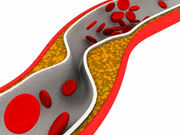Tag: Anticoagulants
Similar Outcomes for Bivalirudin, Heparin in STEMI With PCI
No significant difference in rate of composite end point of death, myocardial infarction, or stroke
Anticoagulation May Help Prevent Dementia in A-Fib Patients
Dementia rates up with delays in anticoagulation treatment for atrial fibrillation
Anticoagulation May Help Prevent Dementia in A-Fib Patients
Even patients with a low risk of stroke could benefit, researchers say
E-Health-Based Management of Oral Anticoagulation Tx Beneficial
E-health-based coagulation service linked to lower frequency of adverse events
Ischemic Outcomes Don’t Vary With Gender in ACS Patients
No difference by gender for ACS patients undergoing PCI receiving clopidogrel, prasugrel, or ticagrelor
Major Bleeding Risk From Drugs Similar in Elderly
Elderly taking aspirin, clopidogrel have major bleeding similar to that seen with oral anticoagulants
Overall Risk of VTE Recurrence Similar for iSVT, Proximal DVT
Isolated superficial vein thrombosis tied to increased risk of iSVT recurrence, lower risk of deep-VTE events
DAPT Cessation Patterns Vary With Diabetes Status After PCI
Risk of major adverse cardiovascular events up for DAPT disruption, regardless of diabetes status
Long-Term Thrombolytic Tx No Benefit in Intermediate-Risk PE
Findings at three years for tenecteplase vs placebo in patients with intermediate-risk pulmonary embolism
Patients Have High Confidence in Self-Testing INR
Seventy-three percent of patients report being confident in adjusting their own warfarin level














